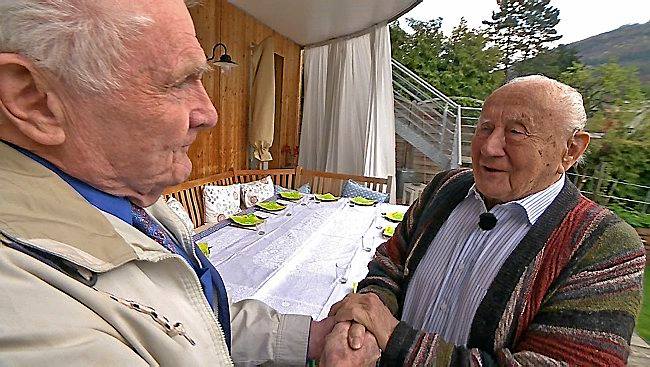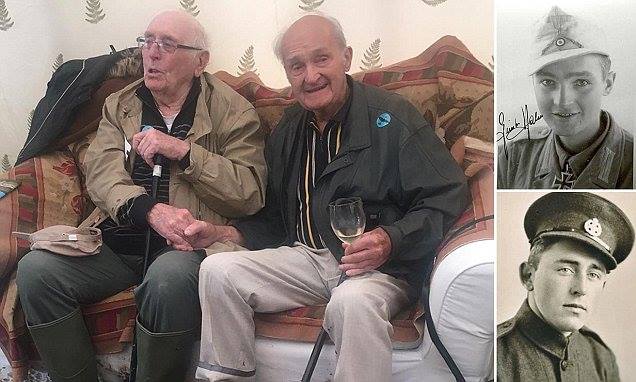A cursory read of WWII events reveals extensive horrific suffering and deprivation visited upon millions on all sides. Inspired by Harada and Mori’s amazing examples, I immediately realized TLBP would be more compelling by having viewpoints of former German and Japanese veterans. I discovered two extremely compelling stories of former enemies meeting in friendship as senior citizens.
The first involved former ball turret gunner Les Schrenk who spent 15 progressively brutal months as a POW after his plane was downed in February 1944. The German pilot who shot and disabled Schrenk’s plane crucially allowed it to fly to nearby Denmark instead of forcing the crew into the frigid North Atlantic. Schrenk, convinced his life had been spared, spent years searching for the mysterious pilot and eventually in April 2012 visited veteran Hans Hermann Müller at his daughter’s home in Germany.

The visit is well documented and bought tremendous closure for Schrenk concerning an extremely traumatic period of his life. He recalled of the meeting “saying goodbye was very hard. Neither of us wanted to part. We had become very good friends and sadly said goodbye”.
The other concerned a meeting of former adversaries Victor Gregg and Günter Halm at a Chalke Valley History Festival in Salisbury in 2016. Both these men lost comrades in brutal fighting at the Battle of El Alamein during WWII.

Stacked images far right: Mr Halm (top) and Mr Gregg (bottom)
Gregg said subsequently of the encounter:
“There is some sort of comradeship among men who served on the frontline and who put their lives at risk every day, no matter what side they were on. I think that comradeship was there when Gunter and I met. We recognised it in each other. Naturally, he had been on one side trying to kill me and I was on the other trying to do the same. But there was no animosity whatsoever between us. We have both had a hard time of time of it.”
Victor Gregg after meeting former enemy Günter Halm in 2016
Schrenk signed the logbook in 2017, sadly Müller was too ill and has since passed away. Gregg also signed and although Halm agreed to sign, he sadly passed away prior to the book’s arrival in Germany. His wife Regine Halm signed in his stead and kindly offered to obtain the signatures of other German veterans. Only later did I realize that some of these men were veterans of the much feared SS units.
How then to treat with their signatures in a document intended as a tribute? As of this moment I am not aware of any direct involvement of any of the signatories in war crimes. But it is entirely possible that this is the case given their membership in the SS. There is no attempt here to romanticize the tyranny of Nazi or Japanese war crimes and atrocities or indeed that of any other individual, group or nation involved in WWII.
Then, as now, front line fighting was conducted mostly by young men, boys actually, who, stripped of their individuality, were forged into forces highly trained in the business of ending life. TLBP therefore also seeks to gain perspective by examining the experience of the individual within the machinery and madness of war. My interaction with veterans generally, indicates that professional soldiers will readily give their lives for the comrade alongside, long before considering the ideologies and causes of those directing far from the front line. If it is discovered that war crimes were committed by any of the Log Book signatories, it will be presented in all its heinous reality, and duly condemned, much as one would visit a holocaust museum to gain deeper understanding – absolutely not to glorify.
It is important to understand that the perpetrators of these incomprehensible acts were real people who shared a generally common geographic/cultural/educational/social background with their victims. These crimes therefore are further reason to celebrate those Log Book signatories who opposed such evil. We can also recognize that for some adversaries of WWII – men like Harada, Halm and Müller – there was a duty to defend their countries in accordance with the accepted guidelines of combat, often carried out valiantly and with great honor. Ultimately however, I hope the most important legacy of TLBP serves to promote peace while highlighting war’s futility. There is so much more that unites earth’s peoples than divides them if we choose to look beyond our biases and preconceived notions.
The final question of what finally to do with the logbook remains. On one hand it is priceless and unique and on the other, quite ordinary. Though I am immensely proud of my father’s service record, his logbook is one of thousands documenting similar experiences. The signatories’ stories however, have transformed this humble book into a powerful symbol of selfless service, reflection and reconciliation. The Log Book Project is therefore a tribute to all who suffered irreplaceable losses and all who served to purchase the freedoms so often taken for granted today. The book’s future value however, comes from continued research into the expanse of WWII and our retelling of the signatories’ stories. Otherwise the vital lessons they offer remain lost to history.
–Nick Devaux, December 2020
